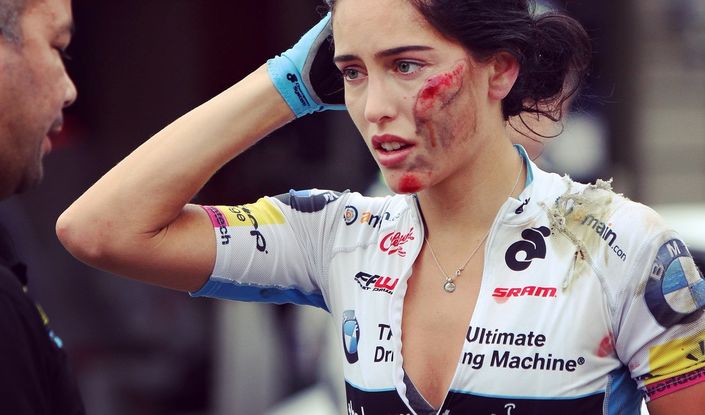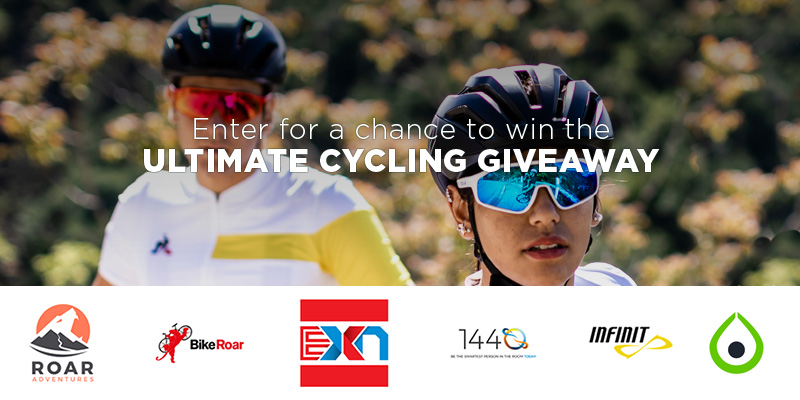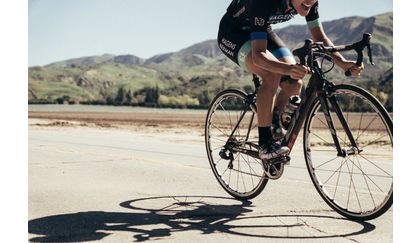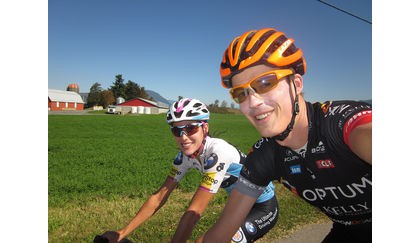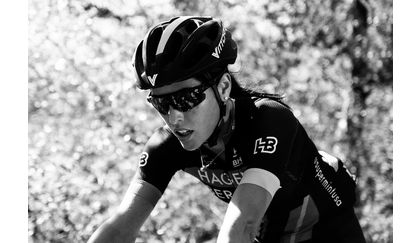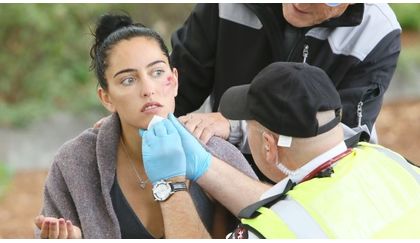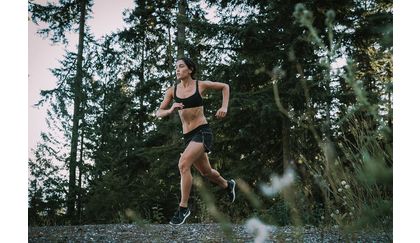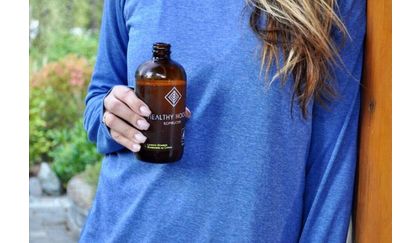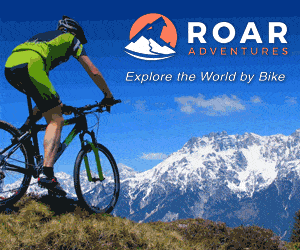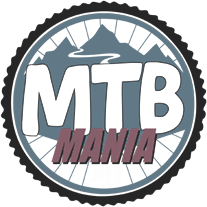If you're going to take advice from someone, you usually seek out a person who has experience in whatever matter you're dealing with. Everyone has an opinion, but you need a useful one from somebody who has been there, seen it, lived it, and can help you with it. That's why we here at BikeRoar are glad to introduce you to one of our newest contributors, Shoshauna Routley.
Shoshauna is a life-long athlete, retired pro cyclist, former national team member, actor, model, singer, writer, and entrepreneur. With that list of accomplishments and her photo above, you can be sure she's a smart, strong, and determined person who is passionate about everything she does and is well qualified to share her cycling advice here.
Continue reading to learn more about Shoshauna, her cycling journey, and the story behind her captivating crash photo.
Profile
Name: Shoshauna Routley (née Laxson)
Age: 32 in 2018
Ethnicity: Filipina mother and Canadian father
Hometown: Texas, moved to British Columbia at age 6
Cyclist since: 2003
Years racing: 10
Years pro: 2 - Hagens Berman-Supermint (2016), BMW p/b Happy Tooth (2015)
Bikes Owned:
- Road: BH G6 Pro frameset with Shimano Ultegra Di2
- Mountain: Scott Spark 710
- Commuter: Kuwahara (1980-something) with 6-speed downtube shifters
How did you get started in sports?
When I was 7, my dad gave me two options: gymnastics or ballet. I chose gymnastics and that’s where my love for athletics started. I played sports through out primary and secondary school and had some natural ability, but my mind was my real strength. In grade 10 I tried out for the basketball team and was disappointed to only make the B squad. I told myself I would make the A squad next time, so that summer I practiced everyday and accomplished exactly what I told myself I was going to.
RELATED: Cycling - How Do I Get Started?
But you didn't become a basketball star?
My family, like many families, could only understand the struggle to earn a living. A hard, cookie cutter, fail-safe job equals stability, money, and a nestegg. That’s what you need to survive and make it into retirement. Nowadays many children are told how special they are and how they can do anything. In my case it was more about what I couldn’t and shouldn’t do. Sport was never on the table outside of being recreation. I’m not blaming anyone, especially not my parents, and looking back at their struggles growing up, it makes all the sense why they believed in stability and acquiring it with the least amount of risk.
I’ve always liked a lot of things, I started to enjoy writing my last year of high school, I was in the chamber choir, I skateboarded, played basketball, squash and softball. I tested out volleyball, the cross country team, and sang in a band. Over all, I dabbled in a lot of different things and crowds. I gravitated towards sport and arts, and fate would have it that way for my parents.
And then you started cycling?
After graduating high school I went to a polytechnic university for turf management, not because I wanted to but because my parents were convinced I could get a high paying job as a golf course manager. Turf management!
After painfully finishing the two-year horticulture diploma, I found road cycling. Two of my friends in high school were siblings and they raced competitively. They gave me my first road bike and introduced me to my future husband, Will, who was also a competitive cyclist at the time. They were very encouraging and supportive.
How did you transition to racing and become a pro?
I was brought up to believe normal people couldn’t be professional athletes. Being around cycling friends and the larger cycling community and hearing their perspectives changed my ill-formed opinion on “professional” sport. I witnessed regular people doing extraordinary things. For the first time in my life I had a dream, a dream that would soon turn into goals, years of dedication, hard work, all whilst riding a roller coaster of emotions.
A couple years after meeting Will, he bought me a road bike and we toured around Australia for three months. When I returned home I decided to give racing a try. For the first couple of years it was as a hobby. I put in work and had fun, but I wanted to get better and saw that I needed to really commit. In 2010 I went all-in. Within a few years I was racing with the Canadian national team and in 2015 made my pro debut with the BMW p/b Happy Tooth team.
Tell us about Will and his great pro career
Will started mountain biking at 10 and racing since 14. He transitioned to road racing at 21 and four year later was racing pro in 2008 with the Symmetrics Cycling Team. He raced with them for four years, then the Jelly Belly team in 2009 and 2010. He was with Spidertech in 2011 and 2012, Accent Jobs in 2013, and spent the last three of his 12 pro years with Optum (2014, 2015), which turned into Rally Cycling in 2016.
His pro cycling career included several high profile victories: the Canadian National Road title in 2010, a stage and King of the Mountains at the 2014 Tour of California, and a stage two win and second overall at Portugal's GP Liberty Seguros.
Why did you retire from pro cycling?
During my time racing, I’ve known men and women who have died doing it. I’ve had traumatic crashes, I was diagnosed with a couple of different heart conditions, and I've experienced the toll that cycling can have on the body and the mind. I figured I could probably keep pushing and make some progress, but not enough to make it feel worthwhile. That, combined with the business-side challenges of cycling and Will's decision to retire made it a good time for me to hang it up, too, so we could pursue new goals together.
About those traumatic crashes - tell us the story behind the photo
It's from the 2015 UCI Tour de Delta’s White Spot Road Race, the women’s qualifier toward the Olympics and World Championships. I had high hopes for that race as it was in my backyard and it was a good course for me. It was one of those days where I actually felt really good, I even put mascara on in preparation for the podium. I normally would never wear makeup on the bike. Looking at the photo and what it has turned into [referring to its popularity on social media], all I can do is laugh. My jersey zipper even shot down due to the impact of the crash! At the time of the photo, I was speaking with my team manager. I think I was saying something like "I think I can get back out there," not really understanding the extent of my injuries.
I went down at about 40-45 km/hour, and from what I can remember, I was T-boned. Another rider came right into me during a sweeping corner and I was completely blind-sided. I remember my hip hitting the pavement, my head following suite, and spinning around from the impact, still attached to my bike. At the time I only felt my hip and nothing felt broken, which obviously meant, "get me a new wheel, fix my bike, I can catch back on!" Despite being beaten by the pavement, the look on my face isn't from the pain, it's from that fact that I probably wasn't going to be able to continue racing, that day or for the rest of the week. I was devastated for the lost opportunity.
After completely covering myself in bandages and sleeping for two days straight, I thought maybe I could finish the week off. I tried to go out for a ride and almost fell over. My brain felt like it was trying to escape, like someone was in there banging on walls, screaming to get out. At that moment I knew my recovery would take more than just a few of days. Skip forward three weeks, I was back at training, prepping for the Tour of Colorado, and then Worlds TTT. Despite crashing out for a while, I was able to get back on the bike and finish on an incredible high.
What kind of riding do you do now?
A lot more indoor trainer and spinning, primarily because the weather makes it much easier to stay inside. I no longer have to train and race in the rain, so I don't. It's also harder to commit the time to ride with everything else going on, and I like to do other things like running, hitting the gym, and climbing. When I do get out, I also like to do mountain biking and gravel riding.
What's your next bike purchase?
Probably an e-bike for commuting. Sometimes I want to get somewhere by bike, but not have to break a sweat.
Why write for BikeRoar?
I love cycling, exercising, being creative, and being a writer. Even though I'm retired from racing, I want to stay involved in the sport and help others. Writing for BikeRoar allows me to keep connected and have a voice while being time-flexible to continue my education and run my new business.
What are you studying for and what's your business?
I am working on my kinesiology degree and personal training certifications. I want to help people with their exercise and training, and specific to cycling, help people get outside to ride.
Our business started with Will and I retiring from pro cycling. Drinking kombucha has been part of our lives for years, so we made the decision to begin brewing it seriously as Healthy Hooch Kombucha. Out of our small farm in Abbotsford, BC, we brew and distribute our certified organic, low sugar, high probiotics, delicious kombucha.
And you still have time for modeling, acting, and singing, too?
I've been modeling since I was 18. I didn't want to be a model as a career and don't do it regularly, but I still have an agent and enjoy doing sports modeling when it's a match. I like roles geared towards showcasing athletes. I'm uncomfortable being just a pretty face. I'm prouder of my cycling and my business and think they're more admirable.
As to singing, I was in choir when I was younger and have a good, unique voice, but never professionally trained. When I was 18, I was looking at ads in the newspaper one day and saw one for a singer. I got in touch with the band, an indie-alt-rock group called "A Gray Medium," auditioned, and they liked me and I got the part. I did that for a few months and moved on.
Any final words?
[Referring to her life and business with Will] - We are lucky enough to have opportunity and willing to see it and grasp it. Cycling has given me so much and I will forever be grateful.
Following are Shoshauna's first three articles for BikeRoar. Check them out, subscribe for free so you don't miss her next ones, and drop your questions or words of encouragement in the comments below.
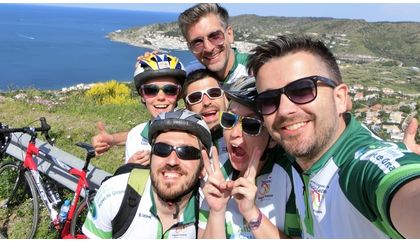
RELATED ARTICLE:
6 ways to make road cycling more fun
Bicycling is fun! Use these six tips to make it funner and better, especially if you need a little help getting your cyclist joy compass or thrill meter tuned up and ready to ride... READ MORE
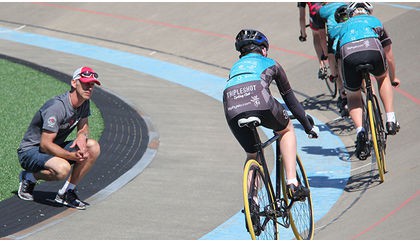
RELATED ARTICLE:
How to pick a cycling coach
A good cycling coach can make you a better cyclist, but how do you pick the right one? We tell you the things to look for and explain how they matter to finding the best coach for you... READ MORE
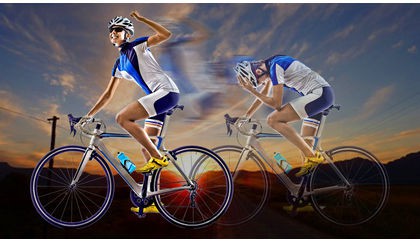
RELATED ARTICLE:
How to keep motivated, get better, and enjoy cycling
Do bicycling challenges have you considering quitting? Don't give up! Use our inspiration, tips, and advice to get over the tough spots and delight in your bike rides more than ever... READ MORE
